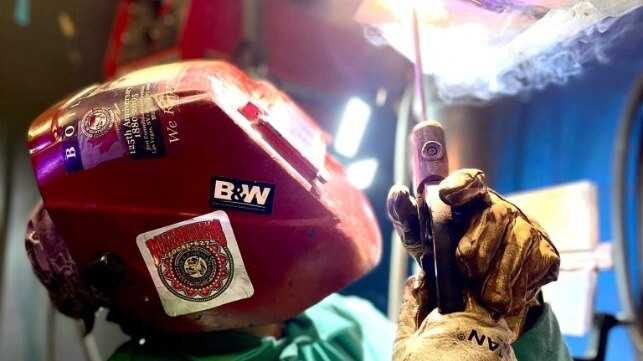Union Deal Will Send Construction-Industry Welders to U.S. Navy Shipyards

The U.S. naval industrial base is operating short-handed, and a shortage of skilled workers is slowing down construction on critical projects like America's next-generation nuclear deterrent, the Columbia-class submarine. The nation's four public shipyards, which handle submarine repairs, are chronically backlogged. A Cleveland-based company, Bartlett Maritime, may have a solution: a rotational hiring system to tap union welders from the construction trades.
Bartlett has reached a deal with the International Brotherhood of Boilermakers (IBB) - a national union for welders and metalworkers - that allows the firm to recruit from among the Boilermakers' construction industry members, anywhere in the country.
“This agreement that we are signing today makes it possible for members of the construction sector of the Boilermakers union to easily take assignments in the Navy’s shipbuilding industrial base,” said Bartlett Maritime Founder and CEO Edward L. Bartlett, Jr. “It both immediately expands union employment opportunities and adds a vast new labor pool to the Navy shipbuilding industry.”
The deal covers most of the negotiations needed to hire Boilermakers members from any locality and redeploy them to another. Since the construction industry is seasonal, these union members have downtime every year, and they can use those months to take up a temporary job in a shipyard. Bartlett has a $3 million contract with the Navy's BlueForge Alliance to set up the program and provide the retraining needed to prepare construction welders for the needs of submarine construction and repair.
"This agreement is an incredible opportunity for those people," said IBB International President Warren Fairley. "This fills in those gaps."
Bartlett Maritime hopes to start with a rotational workforce for other yards, but it also has long-term plans to build a new facility for submarine component repair in northeastern Ohio, where it can tap into the Great Lakes' industrial workforce. By keeping a rotational pool of refurbished submarine parts ready to go, the component repair plant would speed up depot maintenance at the public shipyards dramatically - up to 14 percent, according to Bartlett.
The firm's ultimate goal would be to set up a fifth shipyard for submarine repair, built from the ground up to modern specifications. "It is essential to have designed-in available surge capacity, which means the fifth naval shipyard is less an option than a solid requirement," argued Edward L. Bartlett Jr. in a USNI editorial earlier this year. "The urgency of the Navy’s submarine maintenance crisis, particularly in the face of the current challenges with China’s naval expansion, necessitates bold and innovative responses."
No comments:
Post a Comment